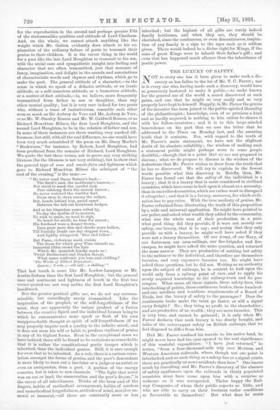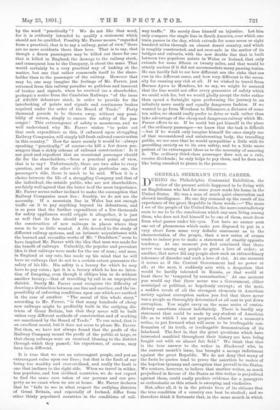THE LUXURY OF SAFETY. N OT to every one has it
been given to make such a diE- covery as has fallen to the lot of Mr. T. C. Ferrer ; nor is it every one who, having made such a discovery, would have so generously hastened to make it public,—to make known for the general use of the world a secret discovered at such pains, and one that he might so very easily and so very properly have kept to himself. Happily, in Mr. Farrer the genius of the inventor has been joined to the public-spirited liberality of the philanthropist ; knowledge, even of so precious a kind and so hardly acquired, is nothing to him unless he shares it with his fellow-creatures ; and it is to this large-minded benevolence on his part that we owe the letter that he addressed to the Times on Monday last, and the amazing truth that it contains, For, with regard to the truth of Mr. Farrer's main statement, we have not the slightest doubt of its absolute reliability ; the wisdom of making such a statement public might perhaps seem to some people doubtful,—though that is a point that we are not prepared to discuss ; what we do propose to discuss is the wisdom of the deductions that Mr. Farrer wishes to draw from the truth that he has so discovered. We will try to explain in the fewest words possible what this discovery is. Briefly, then, Mr. Farrer has found out that the safety of the individual, is a luxury ; that it is a luxury that is more considered in civilised countries, which have come to look upon it almost as a necessity, than in uncivilised countries, which are rather wont to disregard it altogether ; and that it is a luxury, moreover, for which civili- sation has to pay extra. With the true modesty of genius, Mr. Farrer refrained from illustrating the truth of this proposition by a wide and universal application. He might have pointed to our police, and asked what wealth they added to the community, what was the whole sum of their production in a year, what good thing did they provide, if it were not merely our safety, our luxury, that is to say; and seeing that they only provide us with a luxury, he might well have asked if they were not a luxury themselves. Of our Army, of our Navy, of our fortresses, our area-railings, our fire-brigades and fire- escapes, he might have asked the same question, and returned the same answer. They are productive of nothing but safety to the nation or to the individual, and therefore are themselves luxuries, and very expensive luxuries too. He might have asked these questions, but he did not. Writing as an authority upon the subject of railways, he is content to look upon the world only from a railway point of view, and to apply his newly acquired knowledge to the railway-train and its pas- sengers. What mean all these signals, these safety-bars, this interlocking of points, these continuous brakes, these hundred- and-one needless and vexatious requirements of a Board of Trade, but the luxury of safety to the passenger P Does the continuous brake make the train go faster, or will a signal carry freight P No ; they bring no profit to the shareholder; and are productive of no wealth ; they are mere luxuries. This is very true, and cannot be gainsaid ; it is only when Mr. .Farrer declares that such luxury is too dearly bought, and talks of the extravagant safety on British railways, that we feel disposed to differ from, him.
Had Mr. Farrer confined his travels to his native land, he might never have had his eyes opened to the real significance of this wasteful expenditure. " I have just returned," he writes, "from a four-thousand-mile trip over Mexican and Western American railroads, where, though not one point is interlocked, and no such thing as a safety-bar or a signal exists, there are practically no more accidents than here." One learns much by travelling, and Mr. Farrer's discovery of the absence of safety appliances upon the railroads in thinly populated countries must have come upon him with a surprise as welcome as it was unexpected. Thrice happy the Rail- way Companies of whom their public expects so little, and who are able to carry on their business under conditions so favourable to themselves ! 33ut what does he mean by the word "practically " ? We do not like that word, for it is evidently intended to qualify a statement which should not be qualified. Possibly Mr. Farrer means, "regarded from a practical, that is to say a railway, point of view," there are no more accidents there than here. That is to say, that -though a dozen passengers may be killed out there for one that is killed in England, the damage to the railway stock, and consequent loss to the Company, is about the same. That would certainly be a very practical way of looking at the matter, but one that rather commends itself to the share- fielder than to the passenger of the railway. However that may be, one may imagine the feelings of Mr. Farrer, just returned from this railway paradise so guileless and innocent of brakes and signals, when he received (as a shareholder, perhaps) a notice from the Cambrian Railways. " of the issue of £40,000 debenture stock, in order to provide for the interlocking of points and signals and continuous brakes required under the order of the Board of Trade." Forty thousand pounds to be thrown away, without any possi- bility of return, simply to ensure the safety of the pas- senger ! This extravagance of safety is monstrous, and we well understand why Mr. Farrer wishes "to point out that such expenditure as this, if enforced upon struggling Railway Companies, will simply kill fresh railroad construction in this country." How far more seemly it would be – always speaking "practically," of course—to kill a few dozen pas- sengers than a sickly scheme of railroad construction ! Is it not good and expedient that an occasional passenger should die for the shareholders,—from a practical point of view, that is to say P Unfortunately, there are two sides to every .question, and on the other side of this particular one, the passenger's side, there is much to be said. When it is a choice between the life of a struggling Company and that of the individual, the outside public, who are not shareholders, are fairly well agreed that the latter is of the most importance.
Farrer seems rather inclined to make the assumption that Railway Companies must live : frankly, we do not see the necessity. If a mountain line in Wales has not enough traffic on it to pay anything beyond its debentures, and Is so poor that the further expenditure of a few thousands for safety appliances would cripple it altogether, it is just as well that its fate should serve as a warning against the construction of new railways in places where they seem to be so little wanted. A life devoted to the study of different railway systems, and an intimate acquaintance with the learned and recondite works of Mr. " Bradshaw," seem to -have inspired Mr. Ferrer with the idea that man was made for the benefit of railways. Unluckily, the popular and prevalent idea is that railways were made for the use of man ; and man, in England at any rate, has made up his mind that he will have no railways that do not to a certain extent guarantee the safety of his life. His safety is a luxury for which he may have to pay extra ; hut it is a luxury which he has no inten- tion of foregoing, even though it obliges him to do without :another luxury,—that of travelling by rail in an unpopulous district. Surely Mr. Farrer must recognise the difficulty of drawing a distinction between one line and another, and the im- possibility of enforcing conditions upon one which are omitted in the case of another. "The moral of this whole story," according to Mr. Farrer, " is that many hundreds of cheap new railways might be profitably built in the outlying dis- tricts of Great Britain, but that they never will be built unless very different methods of construction and of working are sanctioned by the Board of Trade." To our mind, that is an excellent moral, but it does not seem to please Mr. Farrer. But then, we have not always found that the profit of the Railway Company meant the profit of the public at large, or that cheap railways were an unmixed blessing to the district through which they passed; his experience, of course, may have been different.
It is true that we are an extravagant people, and put an extravagant value upon our lives ; but that is the fault of our being too wealthy and over-civilised, and really the fault is one that inclines to the right side. When we travel in wilder, less populous, and less civilised countries, we do not expect to find the same care taken of our persons and our pro- perty as we exact when we are at home. Mr. Farrer declares that he "fails to see in what respect the outlying districts of Great Britain, and especially of Ireland, differ from other thinly populated countries in the conditions of rail- way traffic." He surely does himself an injustice. Let him only compare the single line in South America, over which one train passes in the day, which extends for some seven or eight hundred miles through an almost desert country, and which is roughly constructed, and not over-safe in the matter of its bridges and culverts, with the new double line that is built between two populous points in Wales or Ireland, that only extends for some fifteen or twenty miles, and that would be utterly useless if it did not accommodate many passing trains. He can hardly fail to see how different are the risks that are run in the different oases, and how very different is the neces- sity for running any risk at all. If we wished to travel from Buenos Ayres to Mendoza, let us say, we might be assured that the line would not offer every guarantee of safety which we could wish for, but we would gladly accept the risks rather than spend a fortnight upon performing the journey in an infinitely more costly and equally dangerous fashion. If we wanted to go from Wrexham to Ellesmere, a distance of some ten miles, we should really prefer to drive or walk rather than take advantage of the cheap and dangerous railway which Mr. Farrer offers to us. If he could but put himself in the place of the ordinary passenger—we know that the task is difficult —but if he would only imagine himself for once simply one of that unconsidered and uninteresting body, the travelling public, we are sure that he would sympathise a little with its grovelling anxiety as to its own safety, and be a little more patient of its extravagant ideas as to the necessity of assuring it. The ordinary third-class passenger does not, as a rule, receive dividends ; he only helps to pay them, and he does not like being smashed to pieces in the process.



































 Previous page
Previous page